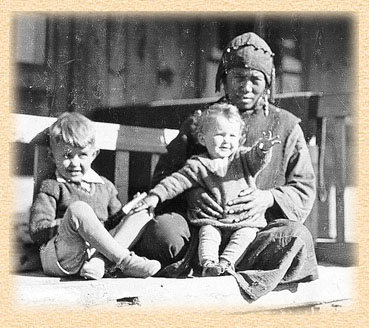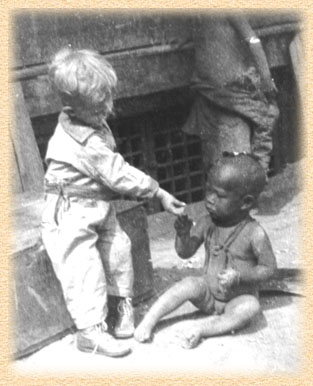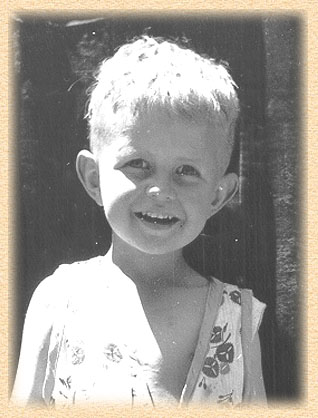 INTERVIEWER: As a child growing up, [train noises in background] what was it like to be part of an American family in a foreign culture? Did it strike you in that way or did it seem...?
INTERVIEWER: As a child growing up, [train noises in background] what was it like to be part of an American family in a foreign culture? Did it strike you in that way or did it seem...?
 INTERVIEWER: As a child growing up, [train noises in background] what was it like to be part of an American family in a foreign culture? Did it strike you in that way or did it seem...?
INTERVIEWER: As a child growing up, [train noises in background] what was it like to be part of an American family in a foreign culture? Did it strike you in that way or did it seem...?
CARLSON: Well, we were different certainly, but yet that was home. That's all I knew. In our home we always spoke English. My parents were determined that their kids would not grow up as some have, speaking only the national language and not English. That's one extreme that has sometimes been found. At the same time, they carefully avoided the other extreme of having their kids speak only English. So that when we became of school age, Mother taught my sister and me for a number of years. We had English school in the morning, and in the afternoon we had Chinese school with a Chinese teacher. They were...they were set on the idea that we should learn both languages, become proficient in...in both. And, of course, Chinese was the only language that we  used outside the home because there were no other missionaries in the area. There were no other English speakers in the area. So as a very young child in...in these Tibetan areas, I spoke English at home, and Chinese and Tibetan with my playmates, who, of course, knew no English.
used outside the home because there were no other missionaries in the area. There were no other English speakers in the area. So as a very young child in...in these Tibetan areas, I spoke English at home, and Chinese and Tibetan with my playmates, who, of course, knew no English.
INTERVIEWER: I was going to ask you that next. Who were your playmates?
CARLSON: The...the kids of the area: children of Christians, neighborhood kids, children of the servants, pastors, preachers, and so on, anybody that was around. But all...all Chinese. The only time that we saw any Western kids was generally at conference time and occasionally during the year when a family would travel through for some purpose or another. But mostly conference time. Annual conference was the only time that we had contact with other missionaries.
INTERVIEWER: From your own experiences, both as a...as a kid and as a parent, what are the advantages and disadvantages of growing up or raising children on the mission field?
 CARLSON: I would say it's a tremendous advantage. I think you...the missionary kid may end up neither...neither fish nor fowl, neither completely American nor completely Chinese, or whatever you have, but something halfway between or a mixture of...of both. Now defi...definitely more American than anything else, but yet not quite totally American. And I have never been sorry. I've never regretted it one bit. Now my life has been a little bit different from that of many missionary kids, so that perhaps I do look at it differently. When...we...we came to the States in '34 and I started school here. I had first grade and part of second grade here in Wheaton. Then we went back in 1936, I believe it was, and Mother continued to teach us. She had been a teacher here in the Wheaton school system before she went overseas, and she was very disciplined. She set up a regular schedule, and we had school every morning. My sister was three years behind me and when it came time for her to start school, she started school. And the morning was set aside for school. Every morning at...I've forgotten what time it was, that was when we started school, and we continued until about noon. So there was not the experience of going away to boarding school which so many missionary kids have.
CARLSON: I would say it's a tremendous advantage. I think you...the missionary kid may end up neither...neither fish nor fowl, neither completely American nor completely Chinese, or whatever you have, but something halfway between or a mixture of...of both. Now defi...definitely more American than anything else, but yet not quite totally American. And I have never been sorry. I've never regretted it one bit. Now my life has been a little bit different from that of many missionary kids, so that perhaps I do look at it differently. When...we...we came to the States in '34 and I started school here. I had first grade and part of second grade here in Wheaton. Then we went back in 1936, I believe it was, and Mother continued to teach us. She had been a teacher here in the Wheaton school system before she went overseas, and she was very disciplined. She set up a regular schedule, and we had school every morning. My sister was three years behind me and when it came time for her to start school, she started school. And the morning was set aside for school. Every morning at...I've forgotten what time it was, that was when we started school, and we continued until about noon. So there was not the experience of going away to boarding school which so many missionary kids have.
INTERVIEWER: You mean separate them?
CARLSON: Right, not separated from parents.
To find out more about Robert Carlson or Collection 205 at the Archives
click here.